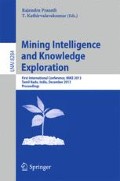Abstract
Sentence comprehension is an integral and important part of whole text comprehension. It involves complex cognitive actions, as a reader has to work through lexical, syntactic and semantic aspects in order to understand a sentence. One of the vital features of a sentence is word order or surface forms. Different languages have evolved different systems of word orders, which reflect the cognitive structure of the native users of that language. Therefore, word order affects the cognitive load exerted by a sentence as experienced by the reader. Computational modeling approach to quantify the effect of word order on difficulty of sentence understanding can provide a great advantage in study of text readability and its applications. Handful of works has done in English and other languages to address the issue. Bangla, which is the fifth mostly spoken languages in the world and a relatively free word order language, still does not have any computational model to quantify the reading difficulty of a sentence. In this paper, we have developed models to predict the comprehending difficulty of a simple sentence according to its different surface forms in Bangla. In the course of action, we have also established that difficulty measures for English do not hold in Bangla. Our model has been validated against an extensive user survey.
Access this chapter
Tax calculation will be finalised at checkout
Purchases are for personal use only
Preview
Unable to display preview. Download preview PDF.
References
Casado, P., MartÃ-n-Loeches, M., Muñoz, F., FernÃ!’ndez-FrÃ-as, C.: Are semantic and syntactic cues inducing the same processes in the identification of word order? Cognitive Brain Research 24(3), 526–543 (2005)
Chatterji, S.-K.: The origin and development of the Bengali language, vol. 2. Calcutta University Press (1926)
Dhar, A., Chatterji, S., Sarkar, S., Basu, A.: A hybrid dependency parser for bangla. In: 24th International Conference on Computational Linguistics, p. 55 (2012)
Gibson, E.: The dependency locality theory: A distance-based theory of linguistic complexity. Image, Language, Brain, 95–126 (2000)
Gibson, E., Piantadosi, S.T., Brink, K., Bergen, L., Lim, E., Saxe, R.: A noisy-channel account of crosslinguistic word-order variation. Psychological Science (2013)
Hall, M.L., Mayberry, R.I., Ferreira, V.S.: Cognitive constraints on constituent order: Evidence from elicited pantomime. Cognition 129(1), 1–17 (2013)
Hashimoto, Y., Yokoyama, S., Kawashima, R.: Neuro-typology of sentence comprehension: Cross-linguistic difference in canonical word order affects brain responses during sentence comprehension. The Open Medical Imaging Journal
Kaiser, E., Trueswell, J.C.: The role of discourse context in the processing of a flexible word-order language. Cognition 94(2), 113–147 (2004)
Langus, A., Nespor, M.: Cognitive systems struggling for word order. Cognitive Psychology 60(4), 291–318 (2010)
Levy, R.: Memory and surprisal in human sentence comprehension (2013)
Meltzer, J.A., McArdle, J.J., Schafer, R.J., Braun, A.R.: Neural aspects of sentence comprehension: syntactic complexity, reversibility, and reanalysis. Cerebral Cortex 20(8), 1853–1864 (2010)
Oya, M.: Syntactic dependency distance as sentence complexity measure. In: Proceedings of the 16th International Conference of Pan-Pacific Association of Applied Linguistics, pp. 313–316 (2011)
Swinney, D.A.: The influence of canonical word order on structural processing. Syntax and Semantics 31, 153–166 (1998)
Weyerts, H., Penke, M., Münte, T.F., Heinze, H.-J., Clahsen, H.: Word order in sentence processing: An experimental study of verb placement in german. Journal of Psycholinguistic Research 31(3), 211–268 (2002)
Author information
Authors and Affiliations
Editor information
Editors and Affiliations
Rights and permissions
Copyright information
© 2013 Springer International Publishing Switzerland
About this paper
Cite this paper
Sinha, M., Rudra, K., Dasgupta, T., Basu, A. (2013). How Word Order Affects Sentence Comprehension in Bangla: A Computational Approach to Simple Sentence. In: Prasath, R., Kathirvalavakumar, T. (eds) Mining Intelligence and Knowledge Exploration. Lecture Notes in Computer Science(), vol 8284. Springer, Cham. https://doi.org/10.1007/978-3-319-03844-5_75
Download citation
DOI: https://doi.org/10.1007/978-3-319-03844-5_75
Publisher Name: Springer, Cham
Print ISBN: 978-3-319-03843-8
Online ISBN: 978-3-319-03844-5
eBook Packages: Computer ScienceComputer Science (R0)

